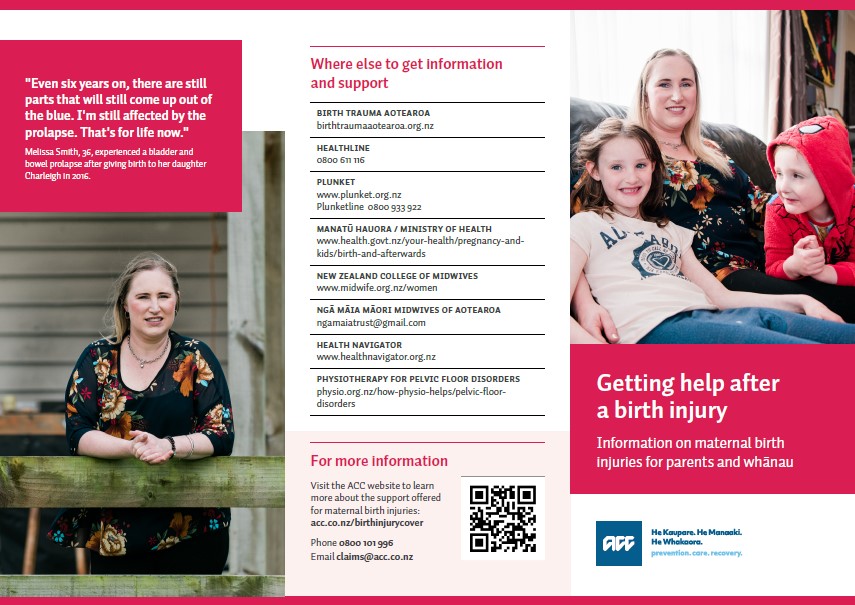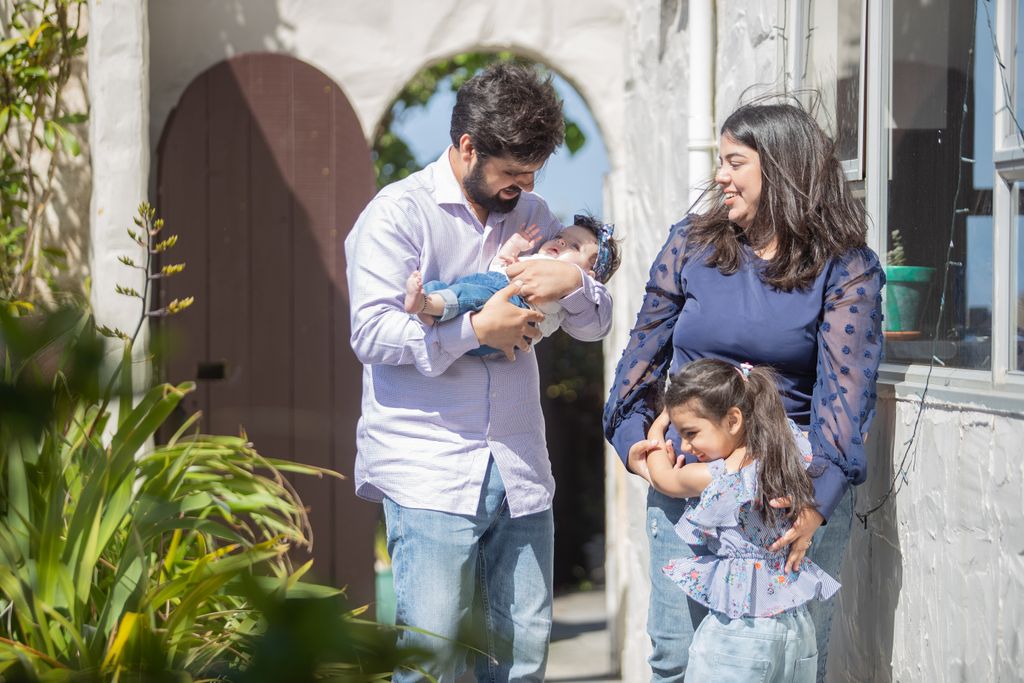Cover for maternal birth injuries
The birth of a pēpi (baby) is a life-changing moment for you and your whānau, but it can also lead to injuries for the birthing parent which take time to recover from.
If you have experienced an injury while giving birth on or after 1 October 2022, we may be able to help with your recovery.
On this page

Getting help after a birth injury
Learn more about maternal birth injuries for parents and whānau and how to get help for an injury.
What to do if you’re injured
Maternal birth injuries can have long-lasting effects so it's important to get treatment and support early on. This will help you recover faster and reduce the impact of related injuries in the future.
Your midwife, doctor, nurse, physio or other healthcare provider can lodge an ACC claim for you after you’re diagnosed with an injury. This might be straight away after the birth of a baby while you’re in the hospital, or sometime after birth when it’s been identified you need further support and care for your injury.
What we cover
We can cover specific maternal birth injuries that happen during labour or delivery on or after 1 October 2022.
We can also help if you have other mental or physical injuries that are caused by your covered birth injury.
If you don’t have one of the listed injuries, you might still be able to get help from us if your injury was caused by medical treatment during birth. Please talk to your doctor or nurse practitioner for advice.
Maternal birth injuries covered by ACC
- Anterior wall prolapse, posterior wall prolapse, or uterine prolapse
- Coccyx fracture or dislocation
- Levator avulsion
- Obstetric anal sphincter injury tears or tears to the perineum, labia, vagina, vulva, clitoris, cervix, rectum, anus, or urethra
- Obstetric fistula (including vesicovaginal, colovaginal, and ureterovaginal)
- Obstetric haematoma of pelvis
- Post-partum uterine inversion
- Pubic ramus fracture
- Pudendal neuropathy
- Ruptured uterus during labour
- Symphysis pubis capsule or ligament tear
What we don't cover
There are some limits to the support we can provide. These limits are set by Parliament, which makes laws about what we can and can’t support.
We’re unable to cover:
- any of the listed injuries that occurred prior to 1 October 2022
- pregnancy-related injuries or illness
- maternal birth injuries not listed above
- injury to pēpi (baby), although they may be eligible for treatment injury cover.
We acknowledge this is difficult for those excluded by this change. If you experienced a maternal birth injury that’s not listed above or which occurred before 1 October 2022, please talk to your midwife, doctor or primary care provider about support available.
Support available from ACC
Once your claim is accepted, you can get the support you need from us. That might be physiotherapy or other specialist treatment or rehabilitation, support at home, or help with other costs.
Your midwife, doctor, nurse practitioner or other healthcare provider will be able to refer you for further treatment. Once you have an accepted ACC claim you can also contact your local ACC-registered treatment provider, such as a physiotherapist, directly to make an appointment.
Find out more about treatment we can help pay for
Rongoā Māori
We also offer traditional rongoā Māori healing services as a rehabilitation option if you’re injured. This is part of our kaupapa Māori health service pathway, which aims to provide culturally appropriate care to māmā, birthing parents and whānau. These services include mirimiri (bodywork), whitiwhiti korero (support and advice) and karakia (prayer).
Find out more about accessing rongoā Māori treatment
Ongoing support
ACC can also assist with other ongoing support while you recover.
What to do if you’re experiencing mental distress
Although it’s a special time, sometimes giving birth can be a traumatic and distressing experience. It’s common for new parents to feel down, depressed, anxious, or suffer from the ‘baby blues’.
If you have a covered maternal birth injury, we may be able to help pay for counselling and therapy sessions to support you to recover from your physical injury.
Contact us to discuss your needs.
Phone 0800 101 996
Should you be diagnosed with a mental injury resulting from your maternal birth injury, for example post-traumatic stress disorder, you may be eligible for mental injury cover. This requires a separate claim to be submitted to us.
Learn more about the counselling and therapy we can help pay for
If you are feeling distressed, please reach out for help. Talk to your doctor or midwife and let them know how you’re feeling. There are other free services available that can provide support.
Where else to go for information and support
Birth Trauma Aotearoa
Provides information and support for parents and whānau following birth trauma.
Healthline
A free service that provides health advice if you’re feeling unwell but aren't sure if you need to see a doctor, and that helps you find services near you.
PlunketLine
A free helpline and advice service available to all families, whānau and caregivers 24 hours a day, seven days a week.
Plunket advice on health and care after birth
The New Zealand College of Midwives
Provides resources about how to care for yourself and what to expect throughout pregnancy, labour and birth and the postnatal period.
New Zealand College of Midwives
Ngā Māia Māori Midwives o Aotearoa
A national body that represents Māori birthing. The kaupapa of Ngā Māia focuses on māmā, pēpi, whānau and promoting mātauranga Māori in pregnancy and childbirth.
Email ngamaiatrust@gmail.com
Physiotherapy New Zealand
Provides information about how physiotherapy helps, including for pelvic floor disorders.
Helplines that offer mental health support
Anxiety Line
Phone 0800 2694 389
Depression Helpline
Phone 0800 111 757
Lifeline
Phone 0800 543 354 or 09 5222 999 within Auckland
Parent Help
Phone 0800 568 856
Suicide Crisis Helpline
Last published: 23 April 2025

